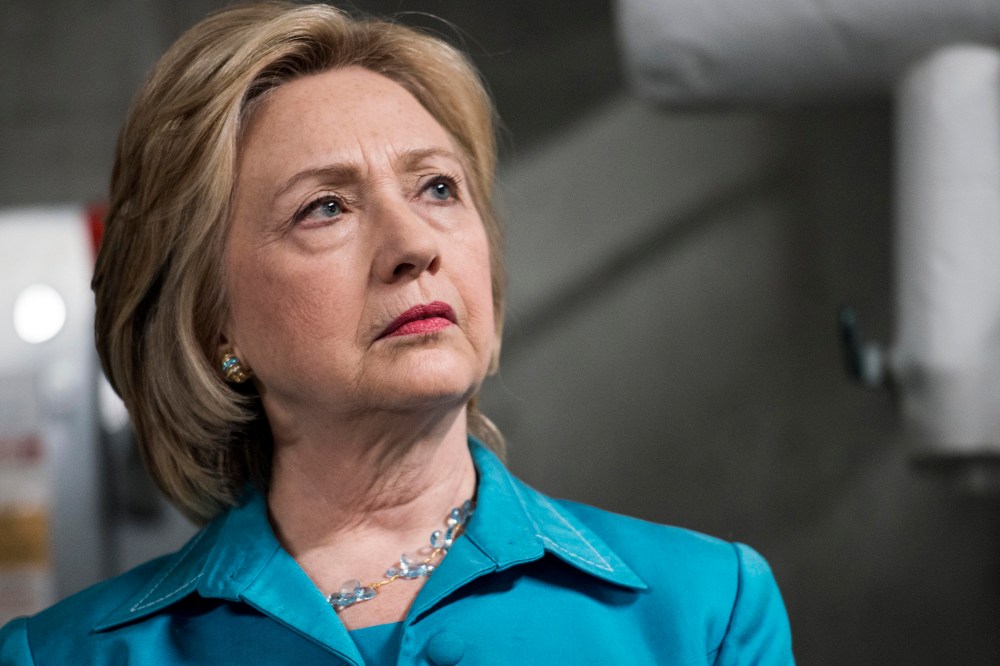Last week, when Hillary Clinton was asked in South Carolina about an anti-abortion group’s secret recordings of Planned Parenthood officials, she offered a robust defense of the organization. But in an interview with the New Hampshire Union-Leader, she sounded a more cautious note about the videos, which show high-level Planned Parenthood officials discussing reimbursement rates and procedures for fetal tissue donations. The anti-abortion group behind the videos and its allies claim they show Planned Parenthood broke federal law, giving new fuel to a Republican push to strip the organization of non-abortion-related funding.
“I have seen pictures from them and obviously find them disturbing,” Clinton told the paper of the videos. “Planned Parenthood is answering questions and will continue to answer questions. I think there are two points to make. One, Planned Parenthood for more than a century has done a lot of really good work for women: cancer screenings, family planning, all kinds of health services. And this raises not questions about Planned Parenthood so much as it raises questions about the whole process, that is, not just involving Planned Parenthood, but many institutions in our country. And if there’s going to be any kind of congressional inquiry, it should look at everything and not just one (organization),” she said.
Related: Planned Parenthood responds to new undercover video
Hours later, at a press conference held by Senate Republicans seeking to defund the organization, Iowa Sen. Joni Ernst said, “Now Hillary Clinton is calling these Planned Parenthood images disturbing, and I agree.”
Some interpreted Clinton’s reference to other institutions as a way to note that many institutions participate in fetal tissue donation programs. The New York Times reported that last year, the National Institutes of Health provided $76 million in grants for medical research on fetal tissue. Conservative commentators claimed she must have been suggesting that other abortion providers be investigated, too. msnbc reached out to the Clinton campaign for clarification.
Fellow Democratic candidate and Vermont Sen. Bernie Sanders, after initially simply noting that he agreed with the apology Planned Parenthood president Cecile Richards had offered, issued a fuller-throated statement supporting the organization on Wednesday and condemned efforts to defund it. “The current attempt to discredit Planned Parenthood is part of a long-term smear campaign by people who want to deny women in this country the right to control their own bodies,” Sanders said.
Another Democratic presidential hopeful, Martin O’Malley, has been more tentative than either Clinton or Sanders. A spokeswoman for O’Malley said he opposes defunding the group, and pointed to remarks he recently made to a reporter in New Hampshire. “I haven’t seen the videos,” O’Malley said then. “And I don’t generally make a habit of responding to right-wing videos. I do know that 97% of the work that Planned Parenthood does is about mammograms and preventative health. So that’s what I know, but I’ll defer to others for commenting on that video and whatever videos they’re pumping out there.”
Clinton has a strong record in favor of abortion rights, as did her husband as president, but over the years, both Bill and Hillary Clinton have employed rhetoric that frustrated abortion rights groups. Bill Clinton famously popularized “safe, legal, and rare” to refer to abortion, a formulation that abortion rights activists have criticized for stigmatizing women who have abortions and for taking a preemptively apologetic stance. These activists would prefer the focus be on women having access to both contraception and abortion on their own terms. Indeed, in 2012, “safe, legal and rare” was removed from the Democratic platform. In the two most recent elections, Democrats have sounded a far more confident note on abortion rights than the one the Clintons chose.
Related: Planned Parenthood president calls video a ‘smear campaign’
Faye Wattleton, who was president of Planned Parenthood until 1992, told journalist Rebecca Traister in her book about the 2008 election, Big Girls Don’t Cry, that she was hoping to hear from Clinton as a presidential candidate that “unintended pregnancy should be rare and that abortion should be safe and legal.’”











